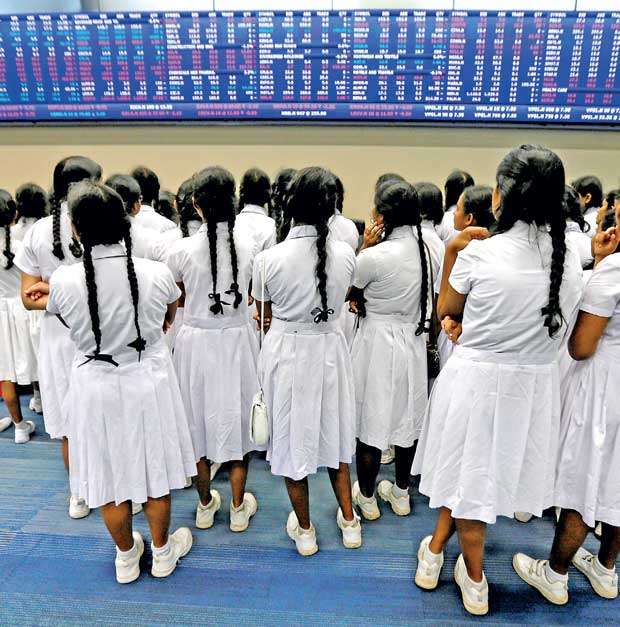Reply To:
Name - Reply Comment

 The All Share Price Index (ASPI) decreased eight points or 0.14 percent to 5872 on Wednesday, October 10, from 5880 in the previous trading session and on Thursday, down to 5840.
The All Share Price Index (ASPI) decreased eight points or 0.14 percent to 5872 on Wednesday, October 10, from 5880 in the previous trading session and on Thursday, down to 5840.
Historically, the Sri Lanka stock market (CSE All Share) reached an all-time high of 7811.82 in February of 2011 and a record low of 4258.80 in June of 2010.
According to analysts, net foreign selling of Sri Lanka’s stocks and bonds is nearing US $ 500 million dollars for 2018. The outflows have been one of the key significant factors in the devaluation of Sri Lanka’s currency and also the declining foreign reserves.
Based on the CSE data, the year-to-date in 2018, net foreign selling of Sri Lanka’s stocks and government securities stands at Rs.83 Billion (US $ 486 million). A net of Rs.77 billion has come out of government bonds, while Rs.6 billion has come out of the Colombo stock market
Current situation
Many of the emerging markets have been hit recently by external shocks, as outflows from emerging markets have caused those countries’ respective currencies and capital markets to weaken very badly.
The Sri Lanka rupee (LKR) sits at an all-time low of Rs.171 to the dollar, while the local stock market is in the doldrums for the last six months, partially due to the since of the past.
Foreign reserves in Sri Lanka have declined in Sri Lanka from close to US $ 8.6 billion at end-August to near US $ 7.2 billion by the end-September. The major stock market indices in the country, the ASPI and S&P SL 20, are down close to 10 percent and 20 percent, respectively for 2018.
Trading volumes at the CSE have reduced significantly, in addition to the stock price declines, with most days registering just a few million dollars worth of transactions. The government needs to intervene and manage this situation.
The declining foreign reserves and currency value have so far been combated mainly with credit and import controls. There have been limited interventions in the currency markets. The government needs to be proactive in addressing these challenges by engaging with the private sector and listening to them and taking action.
The US interest rates on the US treasuries are set to get to 3.5 percent. Also, the US interest rates are very likely to cause further turbulence in emerging markets and with oil prices set to hit new price levels, Sri Lanka needs to think radically differently to get over this crisis.

Way forward
A successful event was held this week at the London Stock Exchange (LSE), which saw over 100 funds and investors participating and holding a host of one-on-one meetings with Lankan listed companies. This was followed by the symbolic opening of trading of the LSE by Prime Minister Ranil Wickremesinghe.
Having stocks in free-fall in Colombo would sort of put a damper on theses effort and therefore, the brokers and investors say the state intervention through state institutions could help to create a “positive market environment” and could ease out once volatility and the continuing decline stops.
For example, when China’s stock market started crashing earlier this summer, its government responded, in part, by having a giant state-backed financial institution buy shares and support prices. Suffice to say, this is not how markets are typically managed in advanced economic powers.
But Sri Lanka is an emerging market that needs the state hand holding, when in a crisis. However, fighting to prop up equities prices may not be a good thing for the state if once again the prices promptly tanked again. That is why Sri Lanka needs brilliant technocrats who can pioneer a new form of hybrid, state-private sector-oriented capitalism.
The country’s growth slowdown and market chaos have very quickly dampened that grand image we had three years ago as a top emerging nation and now the running theory seems to be that the government is run by a bunch of clueless incompetents, who are about to crash the economy and the currency.
Neither characterization has been true or fair. The current government is well-suited for industrializing and creating an export power out of the resources and location advantages we currently have.
However, if Sri Lanka ever wants to become a truly advanced economy with thriving markets and attract FDI, they need to have sensible leaders who are willing to bite the bullet and do things very differently and thereby forge ahead courageously.
(Dinesh Weerakkody is a thought leader)